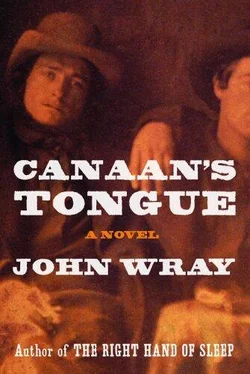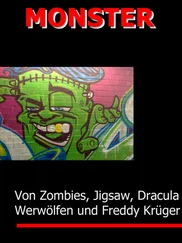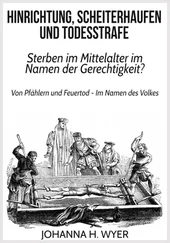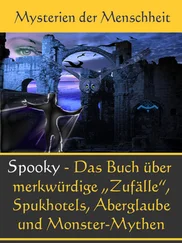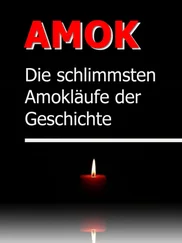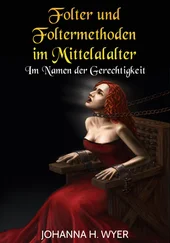I was mid-way across Washington Street, nearly at Stacey’s door, when I suddenly stopped short, as though someone had tapped me on the shoulder, and took a quiet, cautious look about me. The city before me was pristine as a doll-house—: the buildings were spotless, the curbs freshly washed, the window-pots brimming with well-tended flowers. There were men on the street again — dapper, courteous men— and the ladies dipped their bonneted heads to me as I passed. Most of the shops were open, and though carts stood before some of them, piled high with luggage, the general atmosphere was one of cheerful industry. So great was my shock that I felt a need to look behind me—: there, not two streets back, the eastern half of the city lay charred and ransacked and abandoned. A woman in a shift could be seen walking from one side of Main Street to the other, wiping her face with a scrap of cloth that looked, from that distance, like a funeral shroud.
A vision of Clementine overtook me then—: irresistibly and without the least warning, as it always did. I’d spent an entire night with her only two days before, an almost unheard-of privilege. She hadn’t once let me touch her, preferring instead to prattle on about all manner of trifles, reveling in the sway she held me in. Her silhouette rose up before me, thin-limbed and fairy-like, with palings of shuttered light behind her—: the way she held herself languidly but proudly, unmoved by me but moving always for my benefit, stopping now and then that I might admire her better. She was still, four years after our first meeting, the most beautiful woman that I had ever seen. I stood a long time in the middle of the street in that pest-ridden city, letting the idea of her sequester me from ruin.
Inevitably, however, my thoughts declined from Clementine to Morelle. I hung back a moment outside Stacey’s shop-window, thinking of my secret vow and of the chances that I’d actually live to keep it. A reading would be the best time to make my attempt, I reckoned—: Morelle always insisted that we be undisturbed. He was lost in his charts for long stretches afterwards, paying as much mind to me as he did to the candle-stub. Simple enough to put a bullet in him then.
When I tried to imagine the killing itself, however, the breath stuck and clotted in my throat. I was the Redeemer’s opera-glass, as Clementine had put it—: his bauble, his play-thing, to use howsoever he chose. I could no more picture myself assassinating Morelle than finding a cure for yellow fever.
Such, then, were my thoughts as I loitered on Stacey’s door-step. When at last I stepped inside, my heart sank further still. There he was, indefatigable as ever—: Julius Jurisprudence Stacey, the most self-contented profiteer ever to dip his hand into the muddy waters of the Trade. Goodman Harvey sat on a bench just inside the door, grinning from one of us to the other like the insufferable ponce he was. In the absence of Morelle, he directed all of his cloying, lisping humility at Stacey. Stacey’s sweet-potato-shaped paunch was in its customary place, gently astride the corner of his desk—; an evil-smelling meerschaum dangled from his lip.
“Mr. Ball,” he intoned, after a drowsy pause.
“Mr. Stacey,” I answered, ignoring Harvey altogether.
“Am I right in assuming that you come empty-handed?”
This caught me very much off-guard—: I’d expected, and dreaded, the necessity of accounting for myself. Was failure writ so plainly across my face?
“You know already, then?” I mumbled.
“Bechair yourself, gentle traveler,” Stacey said, digging idly at his nose. (Stacey, it was clear, had no health complaints to speak of. I wondered which of the fever cures he subscribed to.)
I did as I was told.
“That’s better.” He set his pipe down decorously. “Now, then—: how long since you and my property in derelictum parted ways?”
“Fifteen minutes,” I answered, staring dully at the floor.
He consulted a hide-bound ledger. “Since the corner of Shelby and Union, was it?”
I practically swallowed my tongue. “I must tell you, Mr. Stacey—”
“That I astonish you?” Stacey beamed side-wise at Harvey, who in turn leered mincingly at me. “I’d like nothing better, Mr. Ball, than to prolong your wonderment—; my conscience, however, won’t permit it.” He gestured over his left shoulder, to the corridor that led out to the pens. “We’ve had a visit from a confederate of yours.”
“Parson,” I said at once. My stomach began to knot together.
Stacey nodded smugly. “Go have a look in the yard. You may find that you are amazed anew.”
“I don’t have to look,” I said. On another day I might have cursed, protested, cried out that it was impossible—; it was impossible, after all. “He brought them all in, didn’t he.”
Stacey only scratched his nose.
“I suppose I ought to feel indebted,” I said.
“You’re upthet, of course,” Harvey put in solicitously.
“Nobody enjoys surprises,” Stacey agreed.
I glared at them both in stony silence. “Where’s Parson now?” I said finally.
“Gone off.” Stacey waved a hand, as if the question were an idle one. Harvey grinned at me and shrugged his shoulders.
All of my impotent anger and disgust settled on Harvey in that instant. If he had a purpose in the Trade other than to annoy me, I had yet to discover what it was. What in hell was he up to? Why hadn’t he met us at the dock? Why in Jesus’ name was he grinning at me that way, like a pig dipped in shite and honey?
“Where was Parson headed?” I said, keeping my eyes on Stacey.
Stacey gazed up at the ceiling, as if to say—: How for us the ways of the clergy?
“He mentioned Jew-town,” Harvey offered. “The houtheth of fun down along the river.”
For all I cared, Parson could have been summoned to the Vatican—; it mattered only that he was well away from me. “In that case I thank you gentlemen very kindly.” I turned to go. “Is there any paperwork to sign?”
“Everything is quite in order, Mr. Ball.” Stacey was looking at me in a way that made me feel uneasy in my skin. Harvey beamed at me me insipidly. The urge to flee was full upon me, but I compelled myself to move toward the door as slowly and lackadaisically as possible.
“Mr. Ball!” Stacey said, just as I took hold of the latch.
“Mr. Stacey,” I answered, turning back to him with a sinking heart.
“There is one thing you might do.” He fussed with a pouch of shag tobacco as he spoke. “A buyer stopped in this morning, asking for you expressly. Amiable sort—; neatly got together. All the trappings of a sucker. He requested that someone fetch him when your coffles got to town.” A wad of leathery-looking leaf was worked free of the pouch, inspected with care, then jammed into the meerschaum’s grimy bowl. “He’s staying at the Pendleton. Bring him round for me, would you? All my boys seem to be under the weather.”
“Why not send Harvey?”
Stacey took a moment to light his pipe. “He asked for you, Mr. Ball. He asked for you expressly.”
This puzzled me not a little. “How did he know I was due?”
Harvey gave a nervous cough. “Because we told him, of course! He knew the path-word, after all.”
“Pass-word?” I said, frowning.
Harvey glanced at Stacey, fiddled with his collar, then gave me a grudging nod.
“That’s the first I’ve heard of any pass-word,” I said tightly. I was beginning to lose my temper. “What in blazes is it?”
“You are,” Harvey said, and coughed again. “That is to say, your name is. Virgil Ball.”
I passed a hand over my eyes. The whole of Memphis had evidently lost its wits. “If I bring this sucker round to you, Mr. Stacey, do I have your permission to quit this wretched place?”
Читать дальше
